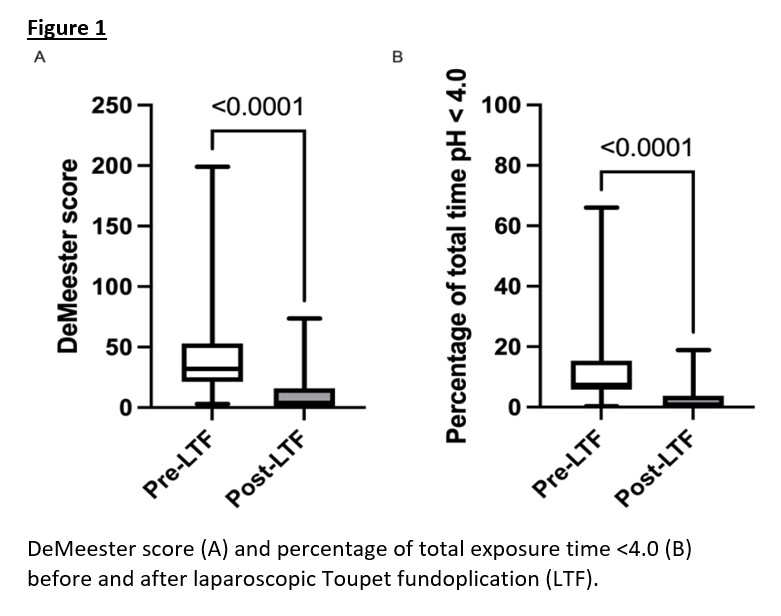Back
Oral Paper Presentation
Annual Scientific Meeting
Session: Plenary Session 3B - Colon / Small Bowel / Esophagus
53 - Laparoscopic Toupet Fundoplication Normalizes Esophageal Acid Exposure While Preserving Foregut Motility and Lung Function in Lung Transplant Recipients (Late-Breaking Abstract)
Tuesday, October 25, 2022
3:25 PM – 3:35 PM ET
Location: Hall C1
Late Breaking Abstract Presenter(s)
Sheetal Patel, MD, Celeste G. Yergin, PhD, Kelly M. Herremans, MD, Andres Pelaez, MD, Tiago N. Machuca, MD, PhD, Alexander L. Ayzengart, MD, MPH, Manuel A. Amaris, MD; University of Florida, Gainesville, FL
Purpose: Gastroesophageal reflux disease (GERD) with microaspiration is a modifiable risk factor for lung transplant (LTx) rejection. Fundoplication may prevent rejection in LTx recipients with GERD. Nissen, the anti-reflux procedure of choice, is associated with higher rates of postoperative dysphagia. We aimed to evaluate the efficacy of laparoscopic Toupet fundoplication (LTF), a less morbid intervention in LTx recipients with GERD. We tested the hypothesis that LTF will provide objective GERD control without worsening foregut motility or lung function.
Methods: A retrospective case series was performed of 56 LTx recipients who underwent LTF between September 2018 to November 2020 with a median follow-up of 31.4 months. Pre- and post-operative results from 24hr pH study (DeMeester score), 4hr gastric emptying study, and high-resolution esophageal manometry [integrated relaxation pressure (IRP), distal contractile integral (DCI), and lower esophageal sphincter pressure (LESP)] were collected. Symptom severity was extracted from chart review. Lung function was assessed using forced expiratory volume in 1 second (FEV1). Data was analyzed with categorical data reported as proportions and continuous data analyzed using two-tailed Wilcoxon test.
Results: After LTF, median DeMeester score decreased from 32.0 to 3.7 (p<0.0001), with percentage of total time with pH<4.0 decreasing from 7.4% to 0.5% (p<0.0001), figure 1. Overall severity of heartburn and regurgitation were also reduced (p<0.0001 and p=0.0002 respectively). There was no difference between pre-and-post-LTF IRP, DCI, and LESP [medians of 10.3 vs 9.1mmHg, 1896 vs 1931mmHg.s.cm, 24.05 vs 25.6mmHg and p=0.2, 0.8, 0.5 respectively]. Post-LTF, the median gastric retention at 4 hours normalized from 13% to 4%. However, the difference did not reach statistical significance [p=0.4]. The symptom severity of bloating, distension, nausea, and dysphagia were not significantly different pre-and-post-LTF. There was no significant difference in FEV1 at 6 weeks, 3 months, 6 months, 12 months, and beyond 1-year post-LFT compared to pre-LTF baseline.
Conclusions: In this study, we demonstrate that LTF provides objective acid reflux control while preserving lung function and foregut motility in LTx recipients without significant postoperative symptoms. In the largest series of LTF in LTx recipients to date, we show that it has the potential to become the anti-reflux procedure of choice in this high-risk population.

Disclosures:
All authors have indicated no relevant financial relationships.
Sheetal Patel, MD, Celeste G. Yergin, PhD, Kelly M. Herremans, MD, Andres Pelaez, MD, Tiago N. Machuca, MD, PhD, Alexander L. Ayzengart, MD, MPH, Manuel A. Amaris, MD, 53, Laparoscopic Toupet Fundoplication Normalizes Esophageal Acid Exposure While Preserving Foregut Motility and Lung Function in Lung Transplant Recipients, ACG 2022 Annual Scientific Meeting Abstracts. Charlotte, NC: American College of Gastroenterology.
Purpose: Gastroesophageal reflux disease (GERD) with microaspiration is a modifiable risk factor for lung transplant (LTx) rejection. Fundoplication may prevent rejection in LTx recipients with GERD. Nissen, the anti-reflux procedure of choice, is associated with higher rates of postoperative dysphagia. We aimed to evaluate the efficacy of laparoscopic Toupet fundoplication (LTF), a less morbid intervention in LTx recipients with GERD. We tested the hypothesis that LTF will provide objective GERD control without worsening foregut motility or lung function.
Methods: A retrospective case series was performed of 56 LTx recipients who underwent LTF between September 2018 to November 2020 with a median follow-up of 31.4 months. Pre- and post-operative results from 24hr pH study (DeMeester score), 4hr gastric emptying study, and high-resolution esophageal manometry [integrated relaxation pressure (IRP), distal contractile integral (DCI), and lower esophageal sphincter pressure (LESP)] were collected. Symptom severity was extracted from chart review. Lung function was assessed using forced expiratory volume in 1 second (FEV1). Data was analyzed with categorical data reported as proportions and continuous data analyzed using two-tailed Wilcoxon test.
Results: After LTF, median DeMeester score decreased from 32.0 to 3.7 (p<0.0001), with percentage of total time with pH<4.0 decreasing from 7.4% to 0.5% (p<0.0001), figure 1. Overall severity of heartburn and regurgitation were also reduced (p<0.0001 and p=0.0002 respectively). There was no difference between pre-and-post-LTF IRP, DCI, and LESP [medians of 10.3 vs 9.1mmHg, 1896 vs 1931mmHg.s.cm, 24.05 vs 25.6mmHg and p=0.2, 0.8, 0.5 respectively]. Post-LTF, the median gastric retention at 4 hours normalized from 13% to 4%. However, the difference did not reach statistical significance [p=0.4]. The symptom severity of bloating, distension, nausea, and dysphagia were not significantly different pre-and-post-LTF. There was no significant difference in FEV1 at 6 weeks, 3 months, 6 months, 12 months, and beyond 1-year post-LFT compared to pre-LTF baseline.
Conclusions: In this study, we demonstrate that LTF provides objective acid reflux control while preserving lung function and foregut motility in LTx recipients without significant postoperative symptoms. In the largest series of LTF in LTx recipients to date, we show that it has the potential to become the anti-reflux procedure of choice in this high-risk population.

Disclosures:
All authors have indicated no relevant financial relationships.
Sheetal Patel, MD, Celeste G. Yergin, PhD, Kelly M. Herremans, MD, Andres Pelaez, MD, Tiago N. Machuca, MD, PhD, Alexander L. Ayzengart, MD, MPH, Manuel A. Amaris, MD, 53, Laparoscopic Toupet Fundoplication Normalizes Esophageal Acid Exposure While Preserving Foregut Motility and Lung Function in Lung Transplant Recipients, ACG 2022 Annual Scientific Meeting Abstracts. Charlotte, NC: American College of Gastroenterology.


